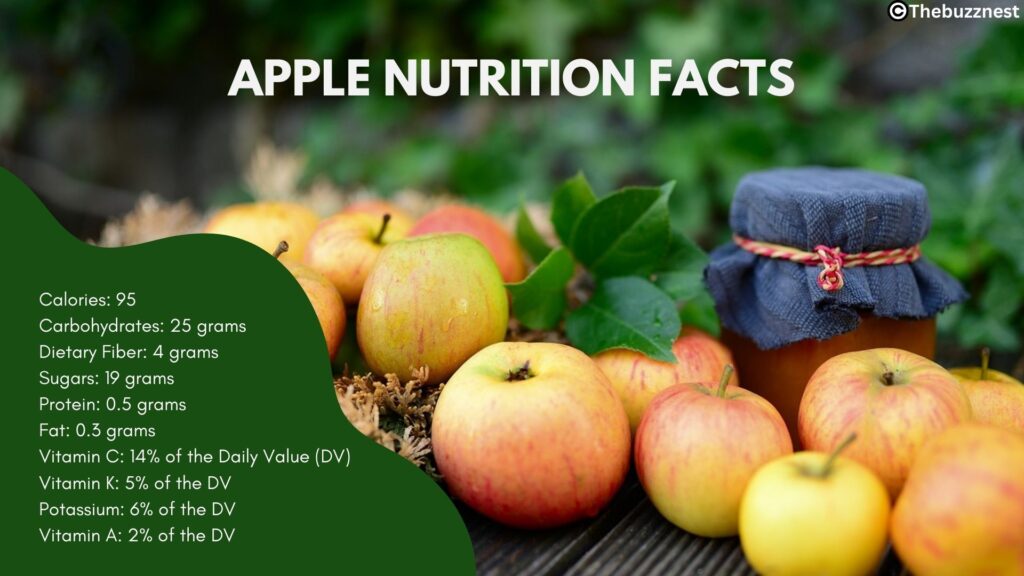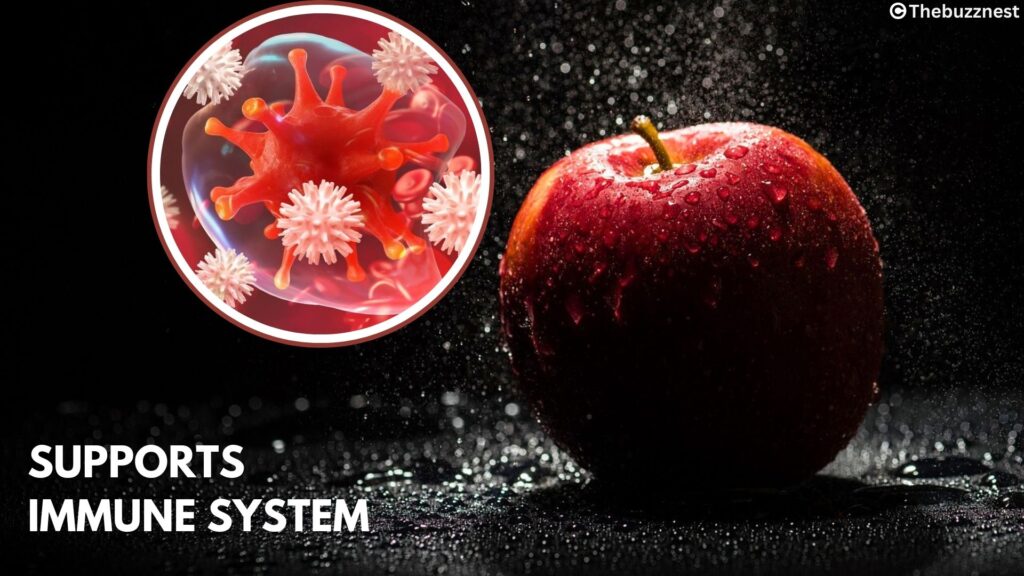“An apple a day keeps the doctor away” is more than just an old adage; it’s a reminder of the numerous health benefits that apples provide, from boosting heart health to aiding in weight management. Apples are a beloved fruit enjoyed by people around the world for their crisp texture, sweet-tart flavor, and impressive health benefits. Originating from Central Asia, apples have become a dietary staple globally, celebrated not only for their taste but also for their nutritional richness. This article explores the Apple nutrition facts, their health benefits, potential allergies, adverse effects, and the variety of apple types available.
Apple Nutrition Facts Explained

Understanding apple nutrition is essential for making informed dietary choices. A medium-sized apple (about 182 grams) provides:
- Calories: 95
- Carbohydrates: 25 grams
- Dietary Fiber: 4 grams
- Sugars: 19 grams
- Protein: 0.5 grams
- Fat: 0.3 grams
- Vitamin C: 14% of the Daily Value (DV)
- Potassium: 6% of the DV
- Vitamin K: 5% of the DV
- Vitamin A: 2% of the DV
Apples also contain small amounts of various other vitamins and minerals, such as vitamin E, several B vitamins, and manganese. Importantly, apples are rich in antioxidants like quercetin, catechin, and chlorogenic acid, primarily found in the skin.
Health Benefits of Apples
Helps in Weight Management

When you think about the calories in an apple, it’s obvious why they’re great for weight management. A medium apple has only around 95 calories. They’re low-cal, but packed with fiber, which keeps you feeling full and helps you eat less overall. Eating apples regularly can help you lose weight and improve your diet.
Improves Heart Health

Eating apples is great for your heart because they’re packed with soluble fiber, especially pectin, which helps lower bad cholesterol. Plus, apples are rich in polyphenols that have anti-inflammatory and antioxidant properties, helping to cut down the risk of heart disease. Research shows that people who eat more apples tend to have a lower chance of developing cardiovascular issues.
Correct your Digestive Health

It’s amazing how something so simple and delicious can make such a difference in how you feel. Apples support digestive health primarily through their fiber content. The insoluble fiber in apples aids in bowel regularity, preventing constipation. The soluble fiber (pectin) acts as a prebiotic, promoting the growth of beneficial gut bacteria. They’re like nature’s perfect snack. Apples are packed with fiber, especially in the skin, which helps keep things moving smoothly through your digestive tract.
Controles Blood Sugar levels

You know what? Apples are great for keeping your blood sugar in check because they have a low glycemic index. The fiber in them slows down how your body digests and absorbs sugar, which helps avoid blood sugar spikes. So just eat apples and lower your risk of type 2 diabetes. There’s so much good stuff in apples that we don’t fully understand, so just eat them and stay healthy and become free of blood sugar.
Do you know who is bhuvan bam’s girlfriend? Here’s what he revealed about his girlfriend Arpita Bhattacharya.
Prevent Cancer

Apples are amazing because they’re loaded with antioxidants like quercetin, catechin, and chlorogenic acid that fight off free radicals. This helps cut down on oxidative stress and inflammation, which are big factors in cancer development. Studies even show that eating apples can lower your risk of certain cancers, like colorectal, breast, and lung cancers. How cool is that?
Improves Brain Health

You won’t believe this, but apples are packed with phytonutrients that protect your brain cells from oxidative damage. This can actually lower your risk of neurodegenerative diseases like Alzheimer’s and Parkinson’s. Animal studies even show that the flavonoid quercetin in apples might prevent brain cell damage and boost cognitive function. Isn’t that incredible?
Support your Immune system

Turns out, apples are loaded with vitamin C, which is a major player in keeping our immune system strong. Plus, they’ve got all these antioxidants that help fight off free radicals, which can mess with our cells. Ever since you’ll start munching on apples regularly, You’ll notice that you’ll don’t catch colds as easily. Apples are a good source of vitamin C, an essential nutrient for the immune system. Vitamin C supports various cellular functions of the immune system, helps maintain the integrity of the skin barrier, and enhances the microbial killing capacity of immune cells.
Allergies

Hey, did you know that while apples are usually safe for most people, some folks can have allergic reactions to them? This is often because of a link to birch pollen allergies. If you’re allergic, you might feel itching or swelling in your mouth and throat, get hives, or, in really severe cases, experience anaphylaxis. The good news is that cooking apples can sometimes reduce these reactions because heat breaks down the proteins that cause the allergy. So, if you’re worried, make sure to check your allergies before diving into apple nutrition!
Adverse Effects

Hey, listen up! While apples are super healthy, going overboard with them can sometimes cause problems. Their high fiber can lead to bloating and gas if you munch on too many. Plus, they’ve got fructose, which might not sit well with folks who have fructose intolerance, causing tummy troubles. And yeah, apples do have natural sugars. Although they’re not as bad as processed sugars, eating too many can add up in calories and might affect blood sugar levels in some people. So, enjoy your apples, but don’t go too crazy!
Want to know who tops the list of richest personalities? We have prepared the list for you!
Apple Varieties

There are thousands of apple varieties, each with unique flavors, textures, and uses. Here are some popular ones:
- Red Delicious: Known for its deep red color and sweet flavor, often enjoyed raw.
- Granny Smith: A green apple with a tart flavor, perfect for baking and salads.
- Fuji: Sweet and crisp, ideal for snacking.
- Gala: Sweet and aromatic, versatile for both eating fresh and cooking.
- Honeycrisp: Known for its crisp texture and balanced sweet-tart flavor, excellent for eating raw and in salads.
- Braeburn: Offers a balance of sweet and tart flavors, great for cooking and baking.
Let me tell you, apples are like the superheroes of fruits! They’re not only delicious but also packed with goodness. From helping you manage your weight to keeping your heart in top shape and even supporting your digestion, they’ve got it all covered. Just keep an eye out for any allergies or side effects. And with so many types out there, you’re bound to find one that fits your taste perfectly. Adding apples to your diet is an easy-peasy way to level up your health game!.

